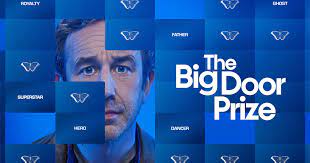The Big Door Prize Review 2023 Tv Show Series Cast Crew Online
What’s your potential? It’s not a question you hear that often — at least, not since you sat in front of a high school guidance counselor or outspoken parent — but it’s certainly one lingering in your mind as you make decisions. Is my job fulfilling enough? Should I move to to another city? Another country? Even when thinking about partners or kids, you may wonder how choosing who to pursue could end up defining the rest of your life — either expanding what you’re capable of or limiting it.
“The Big Door Prize,” an Apple TV+ comedy based on M.O. Walsh’s 2021 novel of the same name, forces the question into the spotlight when a mysterious machine appears (as if from nowhere) within a small town convenience store. Glowing with blue light and built like a ’90s arcade game, the “Morpho” machine invites patrons to sit down in front of its touchscreen, enter a few pieces of information, and receive a card telling them their “true life potential.” Some cards may relate to their recipients what they already know: They’re a good “dad” or “business owner.” Others seem nearly impossible to attain, which can frustrate people who feel so far removed from their brightest future. Still more of the neat little blue cards are strangely opaque: They just list nouns, seemingly at random, as if a person can work hard to become… “chair,” or “ice cream,” or “moose.”
From writer/creator David West Read (“Schitt’s Creek”), the series wisely contains its action to the fictional town of Deerfield, examining how the tight-knit community reacts to such a profound disruption. Rather than dedicate its half-hour episodes to understanding the Morpho machine — no one knows where it came from, how it works, or who (if anyone) is behind it — “The Big Door Prize” gives its character just enough information to invest in what the machine tells them, and proceeds to grapple with questions about our responsibility to ourselves, our families, and our communities, when it comes to reaching for our true potential.
Anyone more invested in getting answers about the Morpho may grow frustrated, and if not for Walsh’s novel, I could’ve been convinced that “The Big Door Prize” was cooked up in an Apple lab as a hybrid of “Ted Lasso” and “Severance.” But the 10-episode first season proves charming, well-considered, and tonally sound. Its priority is always on its ensemble of characters, which brings out the best in an affable cast, and while their conversations about what it all means can sometimes sound like listening to a philosophy debate, the earnest exploration of broad questions remains grounded in who’s speaking.
Take Chris O’Dowd. As Dusty, a school teacher, husband, father, and generally likable fellow, the Irish actor makes for the ideal Joe Six-Pack. But Read and his fellow writers give Dusty a specific backstory and clear character traits, so he doesn’t come across too broad or bland. Like many people who hit middle age and start to feel comfortable, Dusty just wants to enjoy his life. He has a wife, Cass (Gabrielle Dennis), who he loves and likes with equal depth. His daughter, Trina (Djouliet Amara), still likes her parents, despite being a teenager. He enjoys his job at the local high school, and greets just about everyone he sees with a smile and sincere interest in their lives.
But what if… that’s all he’s meant to do? Is that OK? Is that enough? And what if he could do more? Much more, even, and he just never thought to pursue it? What would that mean for his family, his job, and his life? The arrival of the Morpho machine and its promise to distill Dusty’s dreams into definite terms is a bit more than the Irish immigrant can take. After adjusting to a whole new culture once and feeling pretty good about how he turned out, he’s not open to the possibility of doing it again.
Thankfully — as much for Dusty as for the audience watching — the answers aren’t entirely up to him. “The Big Door Prize” pivots to a new character each episode. Dusty and Cass remain at the center of the series, but each ensuing half-hour makes sure to introduce an added wrinkle to the town’s journey by evaluating one more citizen’s true potential. As with any ensemble, some arcs are stronger than others, but Read balances episodes so even if the new focus isn’t perfectly polished, the core cast is there to keep things humming. More importantly, each additional perspective helps to appreciate all the angles involved in answering a question (“What’s your potential?”) without a definite answer.
Well, unless you believe the Morpho card, that is.




